
Miguel Hernandez University of Elche
If you are the contact person for this centre and you wish to make any changes, please contact us.
Nutritionist and Doctor of Public Health from Miguel Hernández University in Elche. Member of the Sports Nutrition Research Group at Alfonso X El Sabio University.
Associate Professor in the Department of Health Psychology at Miguel Hernández University of Elche and researcher at the Center for Research on Childhood and Adolescence
Director of the Nutrition and Bromatology research group.
Full professor at the Miguel Hernández University, specialising in Pharmacology and pain, coordinator of the SED Bioethics working group and coordinator of the Neuropharmacology applied to pain research group of the ISABIAL Foundation
Director of the Institute of Neurosciences, a joint centre of the Miguel Hernández University of Elche (UMH) and the CSIC
Professor and vice-director of the Institute for Research, Development and Innovation in Health Biotechnology of Elche (IDiBE) of the Miguel Hernández University
Researcher in the Biomedical Neuroengineering group at the Miguel Hernández University (UMH) of Elche
Director of the Institute of Bioengineering at the Miguel Hernandez University of Elche and director of the Biomedical Neuroengineering group at the Center for Biomedical Research Network on Bioengineering, Biomaterials and Nanomedicine (CIBER-BBN)
Postdoctoral Researcher, Department of Applied Biology.
Professor of Nutrition at Miguel Hernández University in Elche.

High academic pressure during adolescence is linked to increased rates of depressive symptoms and self-harm, which can persist into early adulthood. This finding, published in The Lancet Child & Adolescent Health, was observed in a sample of nearly 5,000 young people born in England (UK) in 1991 and 1992. Academic pressure was measured when participants were 15 years old, mental health was assessed repeatedly between ages 16 and 22, and self-harm was tracked up to age 24. While the association with depressive symptoms was observed up to age 22, it was strongest at 16. Regarding self-harm, each one-point increase in academic pressure was associated with an 8 % higher likelihood of engaging in self-injurious behavior.

A team from the Miguel Hernández University of Elche and the Alicante Hospital has implanted a microelectrode array in the brains of two blind people. This array is capable of sending electrical stimuli that evoke visual perceptions, something that has been done before, and also of "reading" neuronal responses and adapting to them in real time. The system has allowed them to recognize various complex patterns, movements, shapes, and even some letters. According to the researchers, this new technology "can help make the difference between perceiving a flash and seeing the world." The results are published in the journal Science Advances.

The use of creatine among athletes is not new, although its consumption has become popular on social media. We answer questions about this compound with the help of experts in nutrition, sports and dietetics.
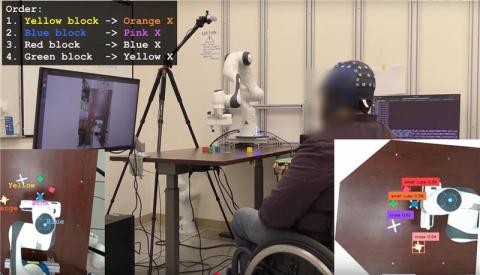
Brain-computer interfaces are devices that decode nerve signals and can help people with paralysis move and communicate. Now, a team at the University of California (USA) has used artificial intelligence tools to improve their functioning. In an initial study, their use improved a person with paraplegia's cursor control fourfold. It also allowed the person to perform tasks with a robotic arm that they couldn't complete without the AI. The results are published in the journal Nature Machine Intelligence.

A team has developed a wearable designed to aid navigation for people who are blind or visually impaired. The system uses artificial intelligence (AI) algorithms to probe the environment and send signals to the wearer when approaching an obstacle or object. The technology, which is presented in Nature Machine Intelligence, was tested with humanoid robots and blind and partially sighted participants in both virtual and real environments.
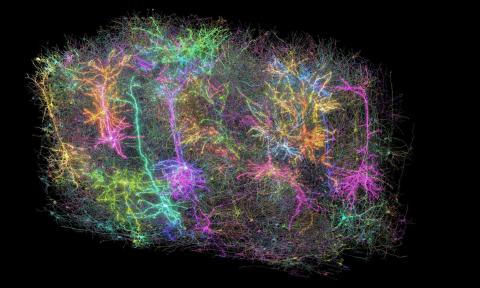
A set of articles published in Nature and Nature Methods draws a high-resolution map of the structure of and connections between the brain cells of mice. The map is based on data from a single cubic millimetre of brain and includes more than 200,000 cells, around 84,000 neurons and 524 million synaptic connections. Although this is a very small part of the mouse brain, it will help us understand how different types of cells work together.
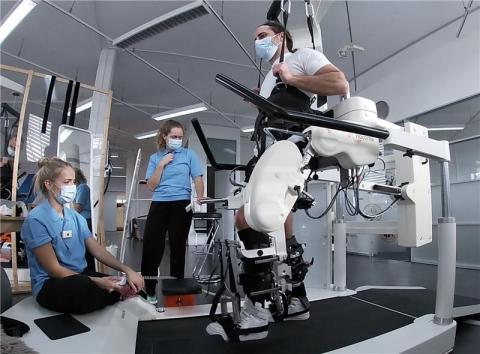
An international team has developed an implantable neuroprosthesis in the spinal cord that can interact with various robotic devices and enable movements in people with severe spinal cord injuries. The study, conducted in nine patients, showed that the device facilitated robotic-assisted walking and cycling and promoted neuromuscular activation. The results are published in the journal Science Robotics.
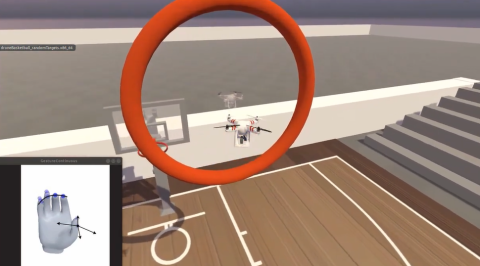
A multidisciplinary team of researchers in the United States has implanted a paralysed person with a brain-computer interface capable of detecting and decoding finger movements. The system achieved a degree of accuracy that allowed him to play a video game. The results are published in the journal Nature Medicine.

In 2015, the human health impact of exposure to certain chemicals cost the equivalent of $1.5 trillion, says a study published in PNAS. The study estimates cases of ischaemic heart disease and stroke associated with bisphenol A (BPA) exposure; deaths of 55-64 year olds associated with di(2-ethylhexyl) phthalate (DEHP) exposure; and cognitive losses in children of mothers exposed to brominated flame retardants (PBDEs).
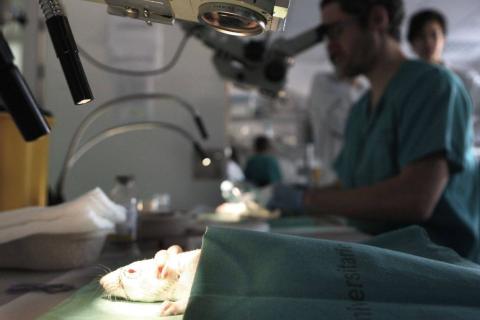
The seventh Annual Report of the COSCE Transparency Agreement, prepared by the European Animal Research Association, which analyses transparency in the use of animals for scientific experimentation in Spain in 2023, was presented today. According to the document, transparency is consolidated among the signatory institutions -168 in 2024- and all of them publish a statement on their websites on the use of animals. Public mention of the number and species used stands at 47%, compared to 38% the previous year.